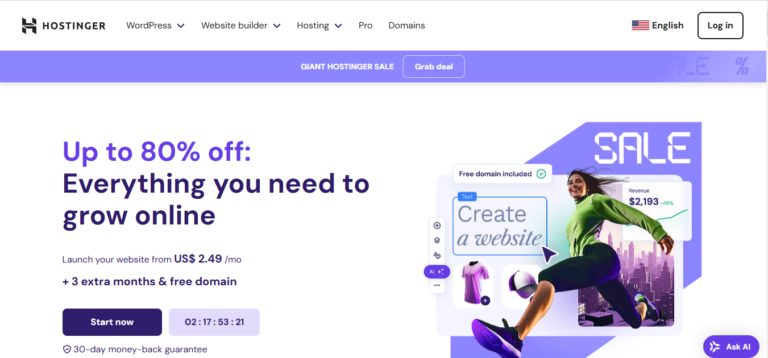Book Appointment Now

Top 5 Hosting Providers for Small Businesses This Year
Choosing the right hosting provider can make or break your small business website.
In 2025, top providers like Bluehost, SiteGround, HostGator, InMotion Hosting, and Hostinger are leading the way with affordable, reliable, and feature-packed plans.
A comprehensive Hosting Review reveals that about 70% of small business websites see more traffic after switching to faster hosting.
That’s why performance matters. Plus, with cyberattacks on the rise, features like SSL certificates and firewalls are non-negotiable.
Reliable customer support is also a must, especially if you’re not a tech expert. Providers like these offer 24/7 assistance to keep your site running smoothly.
Whether you’re just starting out or scaling up, finding the right fit ensures your business thrives online.
Key Factors to Consider When Choosing a Hosting Provider
When picking a hosting provider, you want to make sure it checks all the right boxes. Let’s dive into the most important factors you should keep in mind.
Uptime and Reliability
Imagine your website going down during a big sale or when a potential customer is browsing. Frustrating, right?
That’s why uptime is so critical. The industry standard is 99.9%, which translates to about 8 hours of downtime per year.
Some providers go above and beyond, offering 99.99% uptime (just 52 minutes of downtime annually) or even 99.999% (only 5 minutes of downtime per year).
Pro Tip: Look for providers with uptime guarantees. If they fall short, they often compensate you with credits or refunds.
Reliability also means consistent performance. A good host monitors its servers 24/7 to prevent outages and ensure your site stays online when it matters most.
Performance and Speed
Nobody likes waiting for a slow website to load. In fact, if your site takes more than 2 seconds to load, visitors might leave before they even see your content.
Hosting providers can help by using fast technologies like SSD storage and Content Delivery Networks (CDNs).
These tools speed up loading times and keep your site running smoothly, even during traffic spikes.
Here’s what to look for in terms of performance:
- Fast Load Times: Aim for under 2 seconds.
- Modern Tech: SSDs and CDNs are must-haves.
- Regular Monitoring: Providers should track performance to catch issues early.
Did You Know? Websites with faster load times tend to rank higher on search engines. Speed isn’t just about user experience—it’s also great for SEO.
Security Features
Your website is like your digital storefront, and you wouldn’t leave your shop unlocked, would you? Security features protect your site from hackers, malware, and other threats. Here are some essentials:
- SSL Encryption: Keeps sensitive data secure and prevents browsers from flagging your site as unsafe.
- Firewalls: Block malicious traffic and prevent attacks.
- Backups: Regular backups ensure you can recover your data if something goes wrong.
- DDoS Protection: Stops attacks that could crash your site.
Quick Tip: Always choose a host that offers automated backups and malware scanning. It’s like having a safety net for your business.
Here’s a quick overview of the key factors:
| Factor | Description |
|---|---|
| Security Features | Protects sensitive information with tools like firewalls, backups, and SSL encryption. |
| Uptime | Ensures your site stays online; aim for 99.9% or higher. |
| Cost | Balances affordability with value; look for transparent pricing. |
| Scalability | Supports your business growth without needing to switch providers. |
| Customer Support | Offers 24/7 assistance to resolve issues quickly. |
By focusing on these factors, you’ll set your business up for success with a hosting provider that meets your needs.
Customer Support
When your website runs into trouble, you need help fast. That’s where customer support comes in. A hosting provider with excellent support can save you time, money, and stress. But how do you know if their support is any good?
Here are some key metrics to look for:
- Average Response Time: How quickly do they reply to your questions?
- Average Team Handle Time: How long does it take to resolve your issue?
- Highest Wait Time: What’s the longest you might have to wait for help?
- Team Utilization: Are their support agents overloaded or available?
- Average Customer Satisfaction Score: Do other customers feel happy with the help they received?
Each of these metrics tells you something important. For example, a low response time means you’ll get answers quickly. A high satisfaction score shows that customers trust the support team to solve their problems.
Pro Tip: Look for hosting providers that offer 24/7 support through multiple channels like live chat, email, and phone. This ensures you can always reach someone when you need help.
Some providers even go the extra mile with detailed knowledge bases, video tutorials, and community forums. These resources let you troubleshoot issues on your own if you prefer.
At the end of the day, great customer support gives you peace of mind. You’ll know that no matter what happens, someone has your back.
Pricing and Scalability
Budget matters, especially for small businesses. You want a hosting plan that fits your wallet without sacrificing quality. But don’t just look at the price tag—think about what you’re getting for your money.
Most hosting providers offer tiered pricing plans. These usually include:
- Basic Plans: Ideal for startups or personal websites.
- Mid-Tier Plans: Great for growing businesses with more traffic.
- Premium Plans: Perfect for high-traffic sites or e-commerce stores.
Here’s a quick comparison of what you might expect:
| Plan Type | Features Included | Average Cost (Monthly) |
|---|---|---|
| Basic | 1 website, limited storage, free SSL | $2.99 – $5.99 |
| Mid-Tier | Multiple websites, more storage, backups | $6.99 – $12.99 |
| Premium | Unlimited sites, advanced features, CDN | $13.99+ |
Scalability is just as important as pricing. As your business grows, your hosting needs will change. A good provider makes it easy to upgrade your plan without downtime or hassle.
Quick Tip: Check if the provider offers pay-as-you-go options or discounts for annual billing. These can save you money in the long run.
By balancing cost and scalability, you’ll find a hosting plan that supports your business now and in the future.
Top 5 Hosting Providers for Small Businesses in 2025
Bluehost
Bluehost is a prominent web hosting service provider that delivers a suite of solutions for individuals and businesses to establish and maintain their online presence.
They offer a range of hosting plans, including shared hosting, WordPress hosting, VPS hosting, and dedicated hosting, catering to diverse website requirements and budgets. Bluehost also facilitates domain registration, enabling users to secure unique web addresses.
Notably, they are officially recommended by WordPress and provide optimized hosting specifically tailored for WordPress websites.
Furthermore, Bluehost offers e-commerce hosting solutions equipped with features like shopping carts and payment gateways to support online businesses.
With a focus on reliability, ease of use, affordability, and robust customer support, Bluehost has established itself as a popular choice for website owners seeking a comprehensive and user-friendly web hosting experience.
Key Features
Bluehost stands out as a top choice for small businesses. Its user-friendly interface makes it easy for anyone to set up a website, even if you’re not tech-savvy.
You’ll enjoy dependable uptime, fast loading speeds, and excellent customer support. Plus, Bluehost offers a free domain for the first year, which is perfect if you’re just starting.
These features make it a cost-effective and reliable option for small businesses looking to establish their online presence.
Pricing Plans
Bluehost offers flexible pricing to fit different needs:
- Basic Plan: Starts at $2.95/month, includes one website, 10GB SSD storage, and a free SSL certificate.
- Plus Plan: Costs $5.45/month, supports unlimited websites and storage.
- Choice Plus Plan: Priced at $5.45/month (introductory rate), adds domain privacy and automated backups.
Best Use Cases
Bluehost is ideal for small businesses launching their first website. It’s also great for bloggers and startups that need a simple, affordable hosting solution. If you’re planning to scale, Bluehost’s higher-tier plans can grow with you.
SiteGround
SiteGround is a well-regarded web hosting company known for its high-quality services and excellent customer support. Founded in 2004, they’ve grown to host millions of domains worldwide.
Key Features
SiteGround is known for its premium features and stellar performance. Here’s what you’ll get:
- Superior uptime of 99.99% over the past year.
- Average loading speed of 651ms for faster websites.
- 24/7 live chat support to resolve issues quickly.
- Free drag-and-drop website builder for easy customization.
- Unlimited free email accounts and a free CDN for better content delivery.
- Free WordPress migration and standard SSL certificates.
- Advanced security with a custom web application firewall.
- White-label hosting for managing client websites.
Pricing Plans
SiteGround’s plans are slightly pricier but packed with value:
- StartUp Plan: $3.99/month, supports one website with 10GB storage.
- GrowBig Plan: $6.69/month, includes unlimited websites, 20GB storage, and on-demand backups.
- GoGeek Plan: $10.69/month, adds priority support and staging tools.
Best Use Cases
SiteGround is perfect for small businesses that prioritize speed and security. It’s also a great choice for agencies managing multiple client websites or businesses using WordPress.
HostGator
HostGator is a well-known web hosting provider that has been in business since 2002. They offer a variety of hosting plans, including shared hosting, WordPress hosting, VPS hosting, and dedicated servers, to cater to different website needs and budgets.
Key Features
HostGator caters to small businesses with affordable and flexible hosting options. Here’s what you can expect:
- Shared hosting plans designed for businesses with limited traffic.
- Options like Hatchling (one website), Baby (unlimited domains), and Business (includes free SSL).
- 24/7 customer support and a user-friendly control panel.
- Specialized WordPress hosting for easy setup.
- 99.9% uptime guarantee and a 45-day money-back policy.
- Unlimited bandwidth and free website migration.
- Marketing tools to help grow your online presence.
Pricing Plans
HostGator’s plans are budget-friendly:
- Hatchling Plan: $2.75/month, supports one website.
- Baby Plan: $3.50/month, allows unlimited domains.
- Business Plan: $5.25/month, includes advanced features like a dedicated IP.
Best Use Cases
HostGator is ideal for small businesses on a tight budget. It’s also a great option for beginners who need an easy-to-use platform with reliable support. If you’re running a WordPress site, their specialized hosting makes setup a breeze.
InMotion Hosting
InMotion Hosting is a well-respected web hosting provider known for its high-quality services and excellent customer support. They offer a range of hosting solutions, including shared hosting, VPS hosting, dedicated servers, and cloud hosting, to cater to diverse website needs and budgets.
Key Features
InMotion Hosting is a solid choice for small businesses that need reliable and secure hosting. It offers tailored services designed to meet your business needs. One standout feature is free website migration, which makes switching to InMotion hassle-free. You also get automatic backups, so your data stays safe and recoverable.
Here’s a quick breakdown of what InMotion brings to the table:
| Feature | Description |
|---|---|
| Reliable Hosting | Tailored services for small businesses |
| Free Website Migration | Helps businesses transition smoothly to the new hosting |
| Automatic Backups | Ensures data safety and recovery options |
| 90-Day Money-Back Guarantee | Provides assurance and risk-free trial for new customers |
| SSD Storage | Enhances performance with faster data access |
| DDoS Protection | Increases security against online threats |
| Scalable Plans | Allows hosting to grow alongside the business |
| Development Tools | Offers various tools for website management and development |
With these features, InMotion Hosting ensures your website performs well and stays secure as your business grows.
Pricing Plans
InMotion Hosting offers flexible pricing to suit different budgets. Plans start at $2.99/month for basic shared hosting. If you need more resources, you can upgrade to higher-tier plans with additional features like unlimited websites and advanced security. Plus, their 90-day money-back guarantee gives you plenty of time to decide if it’s the right fit.
Best Use Cases
InMotion Hosting works best for small businesses that need reliable performance and strong security. It’s also a great option if you’re planning to scale your business. The free migration service makes it ideal for those switching from another host.
Hostinger
Hostinger is a popular web hosting provider known for its extremely affordable prices, making it a budget-friendly option for many website owners.
Key Features
Hostinger is a favorite among small businesses for its affordability and user-friendly features. Its AI Website Builder simplifies technical tasks, so you can focus on growing your business. You’ll also benefit from the fast performance, with average load times under 1 second.
Here’s a closer look at what Hostinger offers:
| Feature | Description |
|---|---|
| Affordable Pricing | Plans start as low as $1.99/month. |
| Fast Performance | Average load times under 1 second. |
| User-Friendly Features | Easy setup with a custom control panel. |
| Solid Security | Free SSL, daily backups, and more. |
These features make Hostinger a competitive choice for small businesses in 2025.
Pricing Plans
Hostinger’s pricing is one of its biggest draws. The entry-level plan starts at just $1.99/month, making it one of the most affordable options on the market. Despite the low cost, you still get premium features like free SSL and daily backups.
Best Use Cases
Hostinger is perfect for small businesses on a tight budget. It’s also great for beginners who want an easy-to-use platform. If you’re looking for fast performance and solid security without breaking the bank, Hostinger is a fantastic choice.
How to Choose the Right Hosting Provider for Your Business
Assessing Your Business Needs
Before you pick a hosting provider, take a moment to figure out what your business really needs. Every website is different, so understanding your specific requirements is key. Here’s a simple checklist to guide you:
- Think about your website’s purpose. Will it be a blog, an online store, or a portfolio?
- Estimate your expected traffic. A small site with low traffic needs less power than a growing e-commerce store.
- Set a budget. Compare hosting options to find the best value for your money.
- Plan for growth. Choose a provider that can scale with your business.
- Look for ease of use. A user-friendly dashboard can save you time and headaches.
By following these steps, you’ll have a clear idea of what to look for in a hosting provider.
Comparing Features and Pricing
Not all hosting providers are created equal. Some offer flashy features, but others focus on reliability and performance. To make the best choice, compare what each provider brings to the table.
Start by looking at the basics like uptime guarantees, storage, and bandwidth. Then, dig deeper. Does the provider include free SSL certificates or backups?
What about advanced tools like a Content Delivery Network (CDN) or AI-powered website builders?
For example, as highlighted in a Hosinger Review, their plans include fast performance and affordable pricing, making them a strong contender for small businesses.
Pricing is just as important. Don’t just go for the cheapest option. Instead, think about the value you’re getting.
A slightly higher price might include features that save you money in the long run, like free migrations or enhanced security.
Reading Reviews and Testimonials
You can learn a lot from other people’s experiences. Reviews and testimonials give you a behind-the-scenes look at how a hosting provider treats its customers.
Start by checking online reviews on trusted platforms. Look for patterns. Do customers praise the uptime and speed? Or do they complain about hidden fees and poor support? Testimonials on the provider’s website can also be helpful, but take them with a grain of salt since they’re often curated.
If possible, ask for recommendations from fellow business owners. They might share insights you won’t find in reviews. By doing your homework, you’ll avoid unpleasant surprises and choose a provider that fits your needs.
Testing Customer Support
Customer support can make or break your experience with a hosting provider. When something goes wrong with your website, you’ll want a team that’s quick, knowledgeable, and ready to help. But how do you know if their support is up to the mark before you commit? Testing it yourself is the best way to find out.
Start by sending a pre-sales question to the provider’s support team. Ask something simple, like details about their pricing plans or features. This gives you a chance to see how fast they respond and how professional they are. A quick, clear, and friendly reply is a good sign that they’ll be helpful when you really need them.
You can also test their expertise by asking a few technical questions. For example, you might ask about their security features or how they handle website migrations. Pay attention to how detailed and accurate their answers are. If they seem unsure or give vague responses, that’s a red flag.
Here’s a quick checklist to evaluate their support:
- Response Time: How long did it take to get a reply?
- Clarity: Were their answers easy to understand?
- Professionalism: Did they treat your question seriously?
- Availability: Were they reachable through multiple channels like live chat, email, or phone?
Pro Tip: Look for providers that offer 24/7 support. Problems don’t follow a schedule, and neither should your hosting provider’s help desk.
Some hosting companies also provide knowledge bases, tutorials, and forums. These resources can be lifesavers when you prefer solving issues on your own. Testing customer support before signing up ensures you’ll have reliable help when it matters most. Don’t skip this step—it’s worth the effort!
Choosing the right hosting provider can feel overwhelming, but breaking it down makes it easier. Here’s a quick recap of the top providers:
| Hosting Provider | Key Features | Pricing | Best For |
|---|---|---|---|
| Bluehost | User-friendly, free domain, reliable performance | Starting at $2.95/month | Beginners and growing businesses |
| SiteGround | Stellar speed, advanced security, WordPress tools | Starting at $3.99/month | Agencies and WordPress users |
| HostGator | Affordable, unlimited bandwidth, marketing tools | Starting at $2.75/month | Budget-conscious businesses |
| InMotion Hosting | Free migration, strong security, scalable plans | Starting at $2.99/month | Growing businesses |
| Hostinger | AI tools, fast performance, low-cost plans | Starting at $1.99/month | Small budgets and beginners |
To find the best fit for your business, keep these tips in mind:
- Understand your website’s needs, like traffic and content type.
- Compare plans for value, focusing on transparent pricing.
- Look for a money-back guarantee to test the service risk-free.
- Prioritize uptime, speed, and security to keep your site running smoothly.
- Choose a provider with 24/7 support and scalable options for growth.
By evaluating your needs and comparing options, you’ll confidently pick a hosting provider that helps your business thrive online.



